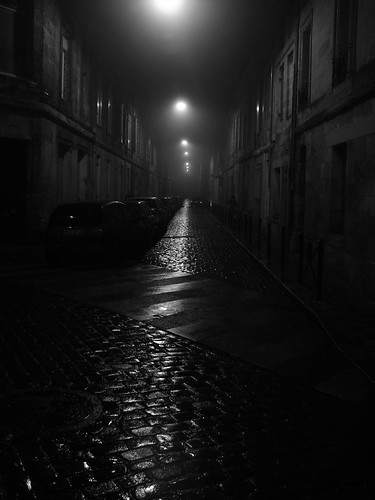
Night does not choose to blind you, it does not force you to listen, yet you do. You shouldn't. You live surrounded by night through night and day. You embrace your sorry life tempting night when night should be tempting you, you twist it until night is not night but night is something you have manufactured for your own progression. You shouldn't. You had been warned about your misuse yet you refused to lift the blackened blindfold to let day embody you, you refused to remove the metaphorical microphones positioned in your ears. You should have listened. You wouldn't.
In this piece, the “catalogue of a change” we might expect to find in a narrative is not the development of a situation or a character, but of a word and an idea. The way the meaning of ‘night’ shifts, gaining and losing connotations, and the way it gives such a strong sense of rhythm to this submission (‘surrounded by night through night and day’, ‘night is not night but night is something you have’ - great feel to these lines) makes this piece seem closer to a prose poem than to prose fiction, for me. However, there is still clearly a development across this piece, and it reaches a really nice conclusion with the elegant variation of the changed-tense last line (‘You wouldn’t). Stylish.
ReplyDeleteOnce again, there’s no obvious “key” to interpreting this piece. I made a fairly traditional correlation of ‘night’ equals ‘evil’ – although the manipulation of the idea of ‘night’ makes this conception far less simple than the equation suggests, of course!
Once again, I feel that alliteration has trapped you into making weak phrases: ‘blackened blindfold’ (well, duh? A blindfold is a blackout…) and ‘metaphorical microphones’ (the image of microphones in ears was, for me, an absurd illogicality – surely, this should be headphones, right? Plus this whole piece is obviously metaphorical so you don’t need to spell it out to the reader). This occasional problem with alliteration is something I, and other moderators, have picked up on before. Try and take this advice on board next time?
I do find your work a bit of a challenge to critique – “ideas novels” and poetry are never something I write myself, or even read with any regularity – but I hope my feedback’s still helpful.
Hey – sorry for the late posting of this.
ReplyDeleteI’m in two minds about this piece. On one hand, it’s a deft and subtle play on the way meaning can morph, where you’re clearing enjoying the wordplay and slow build of narrative. The reader can tell the moments at which you, as the writer, are fully engaged with what you are writing – these are the moments that ring true for the reader.
However – and this is a comment I’ve made on several of your other pieces – I think that the originality and innovation of your writing is sometimes let down by a tendency to go for the “dramatic” (that is established, and probably, therefore, clichéd) option. Your own instinct is very good – the way you twist the meaning in the line “night is not night but night is something you have manufactured” is one example – so it’s a shame when you seem to opt for style over substance. For instance, the line, “you refused to lift the blackened blindfold, you refused to remove the metaphorical headphones” is an example of overwriting. (As Sarah mentioned, too, we really don’t need “metaphorical”; it’s an established contract between reader and writer that we’ll be dealing in metaphor, given that the opening sentence has night “blinding” the addressee.) It’s not true to the emotion; repetition of “refused” and the alliteration make the writing just tip over into extravagant. It’s a shame, because in such a short piece it is very noticeable. Luckily, you rescue the piece with your clean understatement in the last sentence – “You wouldn’t”.
My advice would be to trust your instinct a little more; my guess would be that you sometimes rely on more “dramatic” writing as a safer option, whereas when you’re at your most original, it’s the quiet intensity of the writing that really strikes the reader.